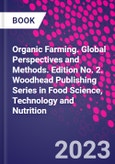Organic Farming: Global Perspectives and Methods, Second Edition provides the core definition and concepts of organic farming, also addressing current challenges and goals. The book provides a comprehensive resource, from sustainability to influences on the ecosystem, including the significance of seed, soil, water and weed management, and other important aspects. In addition, it presents advancements in the field and insights on the future. This fully revised and updated edition expands coverage to include important economic considerations, understanding the influence of nanotechnology on organic farming, vertical farming, organic farming and livestock management, as well as the future of organic farming.
Written by a team of global experts to provide current concepts of organic farming, this resource is valuable for researchers, graduate students, and post-doctoral fellows from academia and research institutions.
Please Note: This is an On Demand product, delivery may take up to 11 working days after payment has been received.
Table of Contents
1. Introduction to organic farming2. Organic farming: Implementation and importance of cultural considerations
3. Contribution of Organic Farming Towards Global Food Security An Overview
4. Fertilizers Need for New Strategies
5. Fertilizer Management Strategies for Enhancing Nutrient Use Efficiency and Sustainably
6. Role of Microorganisms (Mycorrhizae) in Organic Farming
7. Integrated Weed Management in Organic Farming
8. Pest Control in Organic Farming
9. Interactions Between Flowering Plants and Arthropods in Organic Agroecosystems A Review and Case Study
10. The Potential of Agro-Ecological Properties in Fulfilling the Promise of Organic Farming A Case Study of Bean Root Rots and Yields in Iran
11. Organic farming: Case Studies
12. Understanding Organic Agriculture Through a Legal Perspective
13. Impact of organic food and organic agriculture on human health and ecosystem
14. Certification, standards and accreditation in organic farming: An update
15. Vertical farming and organic farming integration: A review
16. Organic agriculture and livestock management
17. Role of organic farming in addressing future challenges
18. Influence of nanotechnology on organic agriculture
19. Bioenergy Production and Organic Agriculture
20. Waste management strategies in organic agriculture
21. Farm waste to wealth
22. Marketing of organic products
23. Economics of organic farming
24. LCA of organic farming
25. Future Perspective in Organic Farming Fertilization Management and Product
Authors
Sarath Chandran Department of Science, Amrita School of Engineering, Amrita Vishwa Vidyapeetham, Chennai, India. His research interests include photocatalysis, green energy harvesting from various sources including, development of eco-friendly fuels, etc..Dr. Sarathchandran C currently serves as an Assistant Professor of Chemistry in the Department of Science and Humanities, School of Engineering, Amrita Vishwa Vidyapeetham, Chennai. He obtained his Ph. D. in 2016 from Mahatma Gandhi University, Kerala.
Unni M.R. Inter University Center for Organic Farming and Sustainable Agriculture, Mahatma Gandhi University, Registrar, Mahatma Gandhi University, Kerala, India. Sri. Unni M. R., is the Hon. Director of Inter University Center for Organic Farming and Sustainable Agriculture, Mahatma Gandhi University, Kottayam, Kerala, India. He is also the Registrar, Mahatma Gandhi University, Kottayam, Kerala, India Sabu Thomas Professor and Director, International and Interuniversity Centre for Nanoscience and Nanotechnology, Mahatma Gandhi University, India.Prof. Sabu Thomas is a Professor of Polymer Science and Engineering and the Director of the School of Energy Materials at Mahatma Gandhi University, India. Additionally, he is the Chairman of the Trivandrum Engineering Science & Technology Research Park (TrEST Research Park) in Thiruvananthapuram, India. He is the founder director of the International and Inter-university Centre for Nanoscience and Nanotechnology at Mahatma Gandhi University and the former Vice-Chancellor of the same institution.
Prof. Thomas is internationally recognized for his contributions to polymer science and engineering, with his research interests encompassing polymer nanocomposites, elastomers, polymer blends, interpenetrating polymer networks, polymer membranes, green composites, nanocomposites, nanomedicine, and green nanotechnology. His groundbreaking inventions in polymer nanocomposites, polymer blends, green bionanotechnology, and nano-biomedical sciences have significantly advanced the development of new materials for the automotive, space, housing, and biomedical fields. Dr. Thomas has been conferred with Honoris Causa (DSc) by the University of South Brittany, France.
Dharmendra Kumar Meena Senior Scientist ICAR-Central Inland Fisheries Research Institute (CIFRI). Dr. D. K. Meena is a Senior Scientist working at ICAR-Central Inland Fisheries Research Institute, Barrackpore, Kolkata, India. Dr. Meena has in his credit more than 60 international, 10 national peer reviewed articles, 25 book chapters, more than 50 popular articles. In addition, he is a member of the Editorial board of Research Biotica, Review Editor of Frontiers in Aquatic Physiology, and Section Editorof the World Journal of Food Science and Technology. Dr. Meena received the Young Scientist Award from the Academy of Environmental Biology, Fellow of Environmental Biology, Fellow of Fisheries and Life Sciences, best Presentation awards in international and national forums. He has worked for more than 10 years on conversion of waste to wealth and his work has been published in high impact journals. He has also commercialized brewery waste-based fish feed, and is currently developing silkworm pupae waste-based fish feed.







